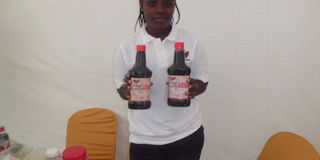Kyoshabire squeezes cash out of hibiscus

Nakayenga shows bottled hibiscus concentrate for making wine. Photos by Lominda Afedraru
Most communities in Uganda in the past considered hibiscus plant as a wild shrub with no value, except for a few people in northern Uganda who used to cook its leaves as vegetable source.
It is of late that people have realised the value of the plant with others processing and drying the flower to make tea leaves, juice and wine.
A family based in Kireka, Wakiso District is now engaging the youth in processing juice out of hibiscus.
Patience Kyoshabire who was passionately displaying the products during the launch at Makerere University Agricultural Research Institute Kabanyolo at the launch of the 5th CURAD- Swiss Contact agribusiness innovations challenge, explains to Seeds of Gold how processing hibiscus juice is a lucrative business, especially for jobless youth in Kampala.
Hibiscus business
“It is a family business based in Kireka with Regina Nakayenga a former lecturer at Kyambogo University as the proprietor although we engage a number of youth in processing the juice. We have a five acre piece of land in Mityana where we grow the plant for processing hibiscus wine and juice. We are operating the initiative under Rena Beverages Limited, a company registered to process hibiscus that comprises many medicinal components,” she explains.
The team also gets flowers from outgrowers in order to meet the growing demand for the juice in and around Kampala.
Varieties
The plant is grown from seedlings which are vegetatively propagated and most farmers engaged in growing it carry out multiplication of the seedlings.
There are three major varieties, Tropical hibiscus, Hardy perennial hibiscus and Hardy shrub hibiscus producing different colours of flowers ranging from pink, red, orange, white and purple among others. Processors can use any of the flowers for processing juice, wine and tea leaves. It can be grown all year round.
The initiative started four years ago and it is growing day by day with a number of youth seeking skills training opportunities to start their own companies.
How to process hibiscus juice
It takes three months for the plant to grow ready to produce flowers which are harvested and dried for a week. It is then soaked in boiled but already cooled water for one day.
Other concentrates such as sugar, citric acid, sweetener and potassium are added.
Tito Kisolo, a brewer and salesman of these products explains that using one litre concentrate of all ingredients mixed, produces 51 litres of juice.
20 kilogrammes of hibiscus flower processed will enable you to obtain 60 cartons of juice.
The equation is that one litre of concentrate is mixed with five litres of water to come up with quality juice.
Prices
The juice is packaged in 300ml each bottle costing Shs1,000 and a carton is sold at Shs10,000 wholesale price.
The team makes two drums of juice on daily basis and measuring 200 litres or more.
The farmers also package concentrate in one litre bottles which they sell each at Shs15,000. Most parents purchase it for their children. The juice is according to Kyoshabire best taken upon diluting with drinking water.
Tea leaves
Apart from making hibiscus juice, the group processes hibiscus tea leaves packaged in 50gms costing Shs3,000 and 100gms costing Shs7,000. These products are distributed in supermarkets within Kampala for onward marketing.
Wine
Kisolo explains that wine processing from hibiscus flower is done in such way that one sack of flowers requires 240 litres of water, 50 kilogrammes of sugar, yeast and citric acid.
It will take 8 – 10 months for it to ferment and once it is ready, it is packaged in 330ml costing Shs5,000 and 750ml costing Shs15,000.
The team has more than 10 tanks measuring 500 litres which are used for processing both juice and wine.
The wine can last eight months and the more it is stored, the more quality it gains.
About hibiscus
Hibiscus juice, tea and wine are also available in supermarket shelves becoming an instant hit with especially the growing middle class.
Hibiscus is particularly a favourite among health conscious consumers due to its many health benefits.
The business is riding on the fact that farmers in Uganda have started commercially growing hibiscus.




